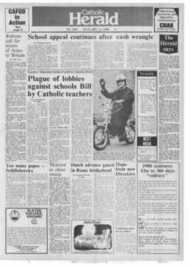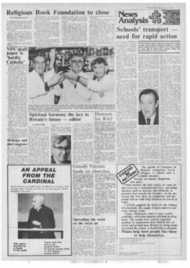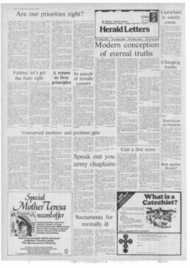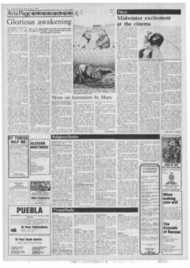Page 10, 11th January 1980
Page 10

Report an error
Noticed an error on this page?If you've noticed an error in this article please click here to report it.
Tags
Share
Related articles
`we Three Kings Of Orient Are. .' Or Are They ?
Vatican And Quirinal
Mysteries Of The Twelfth Night
The Epiphany: Putting Christmas Into Context
Pastor Iuventus
Peculiar gifts of the Magi 4jChartcrhouse2 NChrorucle
The feast of the Epiphany which you have just or just not celebrated is one of those ancient and mysterious feasts that can mean anything but which can never mean nothing. It seems to celebrate three different things.
There is the adoration of the Magi. •There is the Baptism of Christ. There is the miracle of Cana.
All three seem to celebrate the universality of Christ, which must or should make it a feast of triumphant significance. However, we tend to concentrate upon the coming of the Three Wise Men and the addition of three more figures into the crib around which the holly and the ivy was beginning to wilt is our way of doing it. Which is a come down.
St Matthew calls them wise men from the East. Ile does not say how many there were and one. ancient representation of them makes them eight. There is considerable and rather tedious dispute about when and where they came to adore and give their peculiar presents.
WaS it before or after the Flight into.. Egypt? Had the family been back to Nazareth and they then returned to Bethlehem? 1 have not the faintest idea of an answer to these interesting but not fundamental questions.
But the Three Kings are fascinating. St Matthew is the only gospeller to mention them and he merely calls them wise men from the East. The early Fathers of the Church did not call them Kings, though one refers to them as "almost" royal.
It was in the 7th Century that the I .atins gave them the names of Gaspar, Melchior and Balthasar. There are variations on even these names which sound to me like small trumpets well played. The Syrians call them Larvandad. Mornisdas and Gushtiasaph. A little less melodious, perhaps? And not memorable. And more stories have been encrusted upon them than mussels upon some Victorian pier.
There is the suggestion that each of them represented one of the three great families of 'man descended from Noah. They are however, and should be, towering and intellectually true figures
within the Christian myth. And "myth" is not a word that can be used in place of "lie".
Myths tend, under the shadow of eternity, to be inure true than the dedicated researches of dons. Their findings anyway are usually rejected by the next generation.
We have St Matthew's authority that wise men came. It would seem that they were Medes — the other half of the Persians — and that they belonged to a priestly caste.
This would have made them Zoroastrians. This was an fi(X) BC reform of ancient Iranian polytheism. It taught the victory of the spirit of light over darkness. It had a lofty morality. It taught active charity', truthfulness and purity.
After death, souls passed over a bridge of judgement from which the wicked fell to ultimate destruction. This religion was destroyed by the Muslims in the 7th Century.
The religion survives among the Parsecs of Bombay, a minority of exceptional wealth and intelligence. The Magi would have known of the expectations of a Messiah from the Jews left in Babylon.
The early fathers tie themselves into pious knots in trying to explain the significance of the gills. Gold was an obvious gift for a poor family. Even frankincense might be justified in a stable in a society that likes strong sweet smells rather than, as we do, the cleanly absence or all smell.
But myrrh? This is another aromatic gum resin from Arabia and Ethiopia. It was used in incense, in making scents and in embalming. It was about as practical as giving a child a motorcycle.
Incidentally the Queen makes an offering of gold, frankincense and myrrh every Epiphany on the altar of the Chapel Royal in St James' Palace. And where does she get her myrrh now that the royal grocers Jackson's ot Piccadilly are closed? And a "Quarter pound of Myrrh. please. And don't tell me the price has gone up again. It's for a good cause,"
The Magi are said to have got home, to have been baptised by St Thomas on his way to India and to have done a great deal of good. They appear to be buried in Cologne.
Epiphany, by the way, was once the day on which the Church announced the next date of Easter — always the subject of' complicated mathematics. It was also twelfth Night when the English had their last Christmas bash. It is an older feast than Christina; itself and in the 4th Century A.D. the Eastern Church kept January 6th as the birthday of Christ.
You now know all, and indeed slightly more than all that Charterhouse knows about the Magi. The black man among them was clearly an early example of racial tokenism and turning them into kings was simply a way of paying honour to the GodChild. I think.
blog comments powered by Disqus











